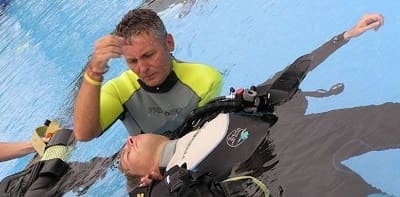Home › Information about Scuba › Diving Injuries › Shock
Signs of Shock in Scuba Divers
There are many triggers that can cause the sudden and complex condition known as medical shock, such as loss of blood, an allergic reaction, or a trauma injury.
This section explains how to recognise the typical signs and symptoms of shock (e.g. low blood pressure), and how to provide emergency care for a scuba diver who is going into shock.
Common Factors that Cause Medical Shock
A sudden drop in blood flow to the vital organs - brain, heart, kidneys - can be caused by:
- Anaphylaxis (severe allergic reactions)
- Bleeding wounds (e.g. haemorrhage)
- Decompression illness (DCI)
- Dehydration (including heatstroke, sunburn)
- Infection or illness
- Marine envenomation (bites and stings)
Pro Tip: Many of the common injuries that scuba divers get can trigger shock symptoms. But, they can also occur as a result of emotional distress or fright.
What is Shock in Scuba Diving?
Insufficient blood flow throughout the entire body means it's a life-threatening condition and a medical emergency.
The factors behind the causes of medical shock are complicated. Even so, anyone can learn how to treat the basic signs and symptoms in the Emergency First Response primary and secondary care course.
5 Different Types of Medical Shock
Anaphylactic Shock
Some individuals are hypersensitive to certain things, such as nuts, seafood, or insect stings. In some cases, they can have a bad allergic reaction to eating them or making contact with them (e.g. jellyfish stings).
Cardiogenic Shock
The common causes are heart attack and congestive heart failure (CHF). Simply put, the heart is unable to supply enough blood to the body.
Hypovolemic Shock
Severe loss of blood and fluids will lead to an inadequate supply of oxygen to the vital organs. But it can also occur due to severe anaemia (low count of red blood cells).
In the same way, dehydration can deplete the water component in blood. If this happens, it will affect the regular circulation of blood.
Pro Tip: A diver with cool clammy skin and symptoms of shock are signs of heat exhaustion. Left untreated, this condition may lead to heat stroke.
Neurogenic Shock
Any serious impact accident, or fall from height, can cause spinal cord injury. This type of medical shock may also interfere with normal breathing, the heart rhythm, and lead to hypothermia (a lack of body warmth).
Septic Shock
If bacteria multiply they can release deadly toxins into a healthy bloodstream. Common causes of sepsis (i.e. blood poisoning) include skin infections, pneumonia, and urinary tract infections (UTI).
Important: Health professionals do not consider diabetic shock as a sign of medical shock. Instead, they state it as being severe hypoglycaemia (dangerously low blood sugar levels).
Shock Signs and Symptoms
 Pale, cold, clammy skin
Pale, cold, clammy skin- Cyanosis (blue colour inside the lips)
- Rapid, weak pulse
- Fast, but shallow breathing
- Weakness, collapse
- Thirst (dehydration)
- Nausea, which may lead to vomiting
- Confusion, anxiety
- Hypoxia (lack of oxygen in body tissues)
- Restlessness and aggressive behaviour
- Heart attack (sudden cardiac arrest)
- Organ damage
- Unconsciousness (including death)
Medical Shock Treatment
The treatment of shock symptoms has several goals. You want to try and maintain adequate blood pressure and to ensure enough blood and oxygen is getting to the patient's vital organs.
Basic First Aid Steps for a Diver in Shock
- Activate the local emergency medical services (e.g. the 24-hour DAN Emergency Hotline) and follow the steps as noted in your diving emergency action plan (EAP).
- If possible (e.g. you don't suspect a spinal injury), lay the diver (patient) on their back and elevate their legs and feet 15 to 30 centimetres (6 to 12 inches). This makes it easier for blood to flow back to the heart.
- Check for breathing and monitor their consciousness (maintain an open airway) to help prevent the situation getting worse.
- Take steps to stop any severe bleeding. So, if you see bright red blood that is spurting this indicates arterial bleeding and a life-threatening situation.
- Provide supplementary oxygen if available and you are trained to use it. Another section explains how you would most efficiently provide oxygen to a breathing, injured diver.
- Protect the diver from the environment (e.g. rain, heat, wind) and cover them with a coat or a blanket to maintain body warmth.
- Give nothing by mouth (except sips of water) and place an unconscious diver on their left side to avoid aspiration of vomit.
- Prepare to perform cardiopulmonary resuscitation (CPR) if it becomes necessary and learn how to use an AED (defibrillator).
Important: When emergency medical staff arrive, they will continue with oxygen administration and intravenous fluids (e.g. for hypovolemic or septic shock).
Related Information and Help Guides
- Check What the Most Serious Lung Overexpansion Injury Is
- PADI Rescue Diver Emergency Action Plan Example
- What is the Most Common Diving Related Injury - and Why?
Note: The short tutorial video [presented by St John Ambulance] explains what to look out for, and then what you should do, if you suspect someone is suffering from shock.